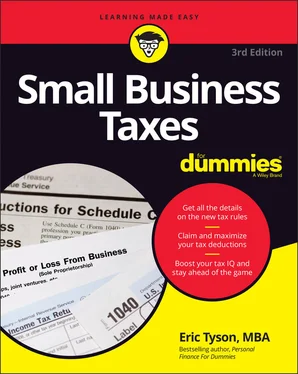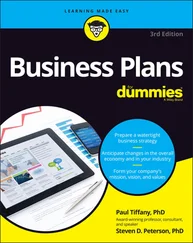1 ...7 8 9 11 12 13 ...16 High flexibility to switch to other entity forms: You can easily switch to any of the other entities (corporation, LLC, and so on) I discuss later in this chapter.
Good retirement plan options: You can stash away a large chunk of your business earnings in a tax-advantaged retirement account (discussed in Chapter 3).
So does this mean that running your small business as a sole proprietorship is the way to go for you and your company? Not necessarily — next up are the drawbacks, which you should weigh in your case.
SIDELINE BUSINESSES, TAX WRITE-OFFS, AND THE HOBBY LOSS RULES
Many supposed tax gurus state that you can slash your taxes simply by finding a product or service that you can sell on the side of your regular employment. The problem, they argue, is that as a regular wage earner who receives a paycheck from an employer, you can’t write off many of your other (personal) expenses. Open a sideline business, they say, and you can deduct your personal expenses as business expenses.
The pitch is enticing, but the reality is quite different. You have to spend money to get tax deductions, and the spending must be for legitimate purposes of your business in its efforts to generate income. If you think that taking tax deductions as a hobby is worth the risk because you won’t get caught unless you’re audited, the odds are stacked against you. The IRS audits an extraordinarily large portion of small businesses that show regular losses.
You need to operate a real business for the purpose of generating income and profits, not tax deductions. The IRS generally considers an activity a hobby (and not a business) if it shows a loss for three or more of the preceding five tax years. ( Exception: The IRS considers horse racing and breeding a hobby if it shows a loss for at least six of the preceding seven tax years.)
Some years, a certain number of businesses lose money, but a real business can’t afford to do so year after year and remain in operation. The IRS commonly views these activities as hobbies, particularly when they generate little if any income: antique collecting, crafts, creating art, photography, stamp collecting, training and showing dogs or horses, and writing.
Even if your sideline business passes this hobby test as well as other IRS requirements, deducting any expenses that aren’t directly applicable to your business is illegal. Also, the Tax Cuts and Jobs Act that took effect in 2018 eliminated the ability for those engaged in a hobby to deduct their expenses as an itemized deduction up to the limit of the income from their hobby for the calendar year. Now, those engaged in a hobby are supposed to report their revenue for tax purposes but are no longer able to claim an itemized deduction for their hobby expenses.
Weighing the disadvantages of operating “solo”
 Organizing and running your small business as a sole proprietorship has its cons, and these may outweigh the pros, depending on the type of business you’re running. Here are the drawbacks you should be aware of:
Organizing and running your small business as a sole proprietorship has its cons, and these may outweigh the pros, depending on the type of business you’re running. Here are the drawbacks you should be aware of:
Liability exposure: Unlike in a corporation, where you have some shielding from liability thanks to the corporate structure, a sole proprietorship offers no such protection. However, as I discuss in the later section “ Investigating liability insurance,” you may be able to buy liability insurance, depending on the type of business you operate.
Only one owner is permitted: If you want to provide some small ownership stakes to key employees, you can’t do that in a solo business. One exception: You can share ownership with your spouse so long as your spouse “materially participates” (that is, works) in the business. If both you and your spouse are owners, you each need to file your own Schedule C (more work), and you each need to pay Social Security tax on your share of the earnings (more tax).
Estate issues: With some business entities, the business structure survives your passing, but not so with a sole proprietorship. This may have negative consequences on the tax front and if you want your survivors to be able to easily continue with the company. (Flip to Chapter 5for an introduction to estate planning.)
You’re taxed on all profits, even if you don’t want to take them all out of the business: If you have a big year or two, don’t need all the money your business is generating, and want to leave some of it in the business, you still pay personal income tax on all those earnings as a solo. Not so with some other entities I discuss later in this chapter.
Increased audit risks: The IRS knows that it finds more tax mistakes and fraud with solo businesses, so on average, it tends to audit such entities at a somewhat higher rate.
Now, in enumerating these possible drawbacks to operating a business as a sole proprietorship, I’m not trying to scare you off from doing so or talk you into, for example, incorporating. You need to consider which pros and cons may or may not apply to your situation and the type of business you’re envisioning or operating. And you need to consider the alternative entities, like the ones later in this chapter.
Deciding whether to incorporate
A corporation, technically speaking, is a legal entity that’s separate from its founders, managers, and employees; it’s owned by shareholders. Your personal assets are protected in case the corporation is sued. C corporations (the subject of this section) provide the most financial protection to shareholders, but many small businesses choose instead to be S corporations because they’re cheaper to start, easier to maintain, and have just one level of taxation compared with the two levels of taxation for C corporations. (I discuss S corporations in more detail later in this chapter.)
Limited liability companies (LLCs) are an increasingly popular option that offer numerous corporate-like benefits (chief among them liability protection) without some of the costs and downsides. Please be sure to read that important discussion later in this chapter.
Before you call a lawyer or your state government offices to figure out how to incorporate, you need to know that incorporating takes time and costs money. Corporations generally involve the highest costs and most administrative hassles among the range of business entities for you to use. There are fees to incorporate, and each state levies an annual fee that you must pay, even if you have no business income that year. You also have higher legal and accounting costs thanks to the more complex tax rules and filings required of corporations, including the dreaded IRS Form 1120, “U.S. Corporation Income Tax Return” (see the first page of the form in Figure 2-1; the complete, most recent form is located at www.irs.gov/pub/irs-pdf/f1120.pdf ).
In some instances, the decision to incorporate is complicated, but in most cases, it need not be a difficult choice. Taxes may be important to the decision but aren’t the only consideration. This section presents an overview of the critical issues to consider. I discuss liability considerations, including whether you can obtain liability insurance for your chosen profession, as well as tax and other considerations.
 If you weigh the following considerations of incorporating and you’re still on the fence, my advice is to keep it simple: Don’t incorporate. After you incorporate, un-incorporating takes time and money. Start as a sole proprietorship and then take it from there. Wait until the benefits of incorporating for your particular case clearly outweigh the costs and drawbacks of incorporating. Likewise, if the only benefits of incorporating can be better accomplished through some other means (such as purchasing insurance), save your money and time and don’t incorporate.
If you weigh the following considerations of incorporating and you’re still on the fence, my advice is to keep it simple: Don’t incorporate. After you incorporate, un-incorporating takes time and money. Start as a sole proprietorship and then take it from there. Wait until the benefits of incorporating for your particular case clearly outweigh the costs and drawbacks of incorporating. Likewise, if the only benefits of incorporating can be better accomplished through some other means (such as purchasing insurance), save your money and time and don’t incorporate.
Читать дальше

 Organizing and running your small business as a sole proprietorship has its cons, and these may outweigh the pros, depending on the type of business you’re running. Here are the drawbacks you should be aware of:
Organizing and running your small business as a sole proprietorship has its cons, and these may outweigh the pros, depending on the type of business you’re running. Here are the drawbacks you should be aware of: If you weigh the following considerations of incorporating and you’re still on the fence, my advice is to keep it simple: Don’t incorporate. After you incorporate, un-incorporating takes time and money. Start as a sole proprietorship and then take it from there. Wait until the benefits of incorporating for your particular case clearly outweigh the costs and drawbacks of incorporating. Likewise, if the only benefits of incorporating can be better accomplished through some other means (such as purchasing insurance), save your money and time and don’t incorporate.
If you weigh the following considerations of incorporating and you’re still on the fence, my advice is to keep it simple: Don’t incorporate. After you incorporate, un-incorporating takes time and money. Start as a sole proprietorship and then take it from there. Wait until the benefits of incorporating for your particular case clearly outweigh the costs and drawbacks of incorporating. Likewise, if the only benefits of incorporating can be better accomplished through some other means (such as purchasing insurance), save your money and time and don’t incorporate.










